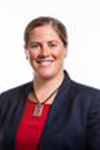Physical Medicine & Rehabilitation
"Physical medicine and rehabilitation is the discipline concerned with preventing, diagnosing, and treating a variety of neurologic, musculoskeletal, and cardiopulmonary disorders through rehabilitative measures. A typical patient base can include, but is not limited to, those with conditions such as strokes, spinal cord injuries, traumatic brain injuries, burn injuries, postchemotherapy and cancer deconditioning, sports injuries, multiple sclerosis, amyotrophic lateral sclerosis, and in children, cerebral palsy, spina bifida, muscular dystrophy, and postoperative orthopedic procedures. Because of the vast spectrum of disease, physiatrists can focus on one (or more) of these medical problems."
— Freeman, B. (2013). The Ultimate Guide to Choosing a Medical Specialty. 3rd Ed. Lange Medical Books/McGraw-Hill: New York.p. 389-390.
M1 and M2 Students
What advice would you offer first- and second-year students who are interested in pursuing your specialty?
If they have not any exposure to those with disabilities, it would be helpful to gain some time either through patient perspectives, shadowing, volunteering with Special Olympics, Shirley Ryan AbilityLab Disability Sports Program or sports medicine clinics. They also may want to consider meeting with PM&R faculty or the chief resident.
How important is a research experience in your specialty? If important, does it need to be in the specialty itself?
If interested in a more top-tier or academic program, research is encouraged but still not required. It is best if it is in PM&R or a related specialty/topic or engineering. But, again, it's not mandatory.
M3 and M4 Students
What M4 electives would you recommend to a student who is interested in pursuing your specialty?
PM&R, radiology, advanced neurology, rheumatology and ortho/sports medicine. It is also generally encouraged for students to get as much training in basic medicine as possible, so electives in areas they feel they might need to be more comfortable with basic medical issues/need more exposure to may also be of benefit.
Does your specialty recommend doing away rotations?
No. Instead, we recommend students do as well as possible in their PM&R elective at NU and then consider an away rotation only if they're strongly interested in one particular program.
If your specialty recommends doing away rotations, how many "aways" do you recommend?
One maximum.
If away rotations are necessary, when should they be completed?
Not applicable.
Which month do you recommend taking off to interview?
December or January.
Does your specialty recommend that all letters of recommendation be written by members of your specialty?
At least one must come from a PM&R physician.
If letters can come from other disciplines, do you have a recommendation as to which disciplines are more highly valued?
In general, medicine and neurology may be slightly more valued, but this varies by individual reviewers.
Does the academic rank of the letter writer matter?
Does your specialty require a letter from the chairman?
PM&R Specialty Session - Winter / Residency Application Information
During the winter of the M3 year, students should attend specialty sessions sponsored by the department to learn more about the specialty and to meet attendings and residents in the field.
